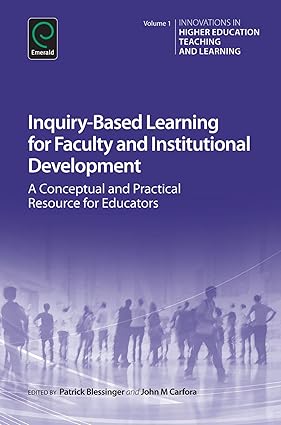 Inquiry-Based Learning for Faculty and Institutional Development: A Conceptual and Practical Resource for Educators: 1 (Innovations in Higher Education Teaching and Learning, 1)
Inquiry-Based Learning for Faculty and Institutional Development: A Conceptual and Practical Resource for Educators: 1 (Innovations in Higher Education Teaching and Learning, 1)
by: Patrick Blessinger (Editor),John M. Carfora(Editor)
Publisher:Emerald Group Publishing Limited
Publication Date: 5 Dec. 2014
Language:English
Print Length:300 pages
ISBN-10:178441235X
ISBN-13:9781784412357
Book Description
Inquiry-based learning (IBL) is a learner-centered and active learning environment where deep learning is cultivated by a process of inquiry owned by the learner. IBL has its roots in a constructivist educational philosophy and it is oriented around at least three components: 1) exploration and discovery (e.g., problem-based learning), 2) authentic investigations using contextualized learning (e.g., field studies), and 3) research-based approach (e.g., research-based learning). IBL encourages more self-regulated learning because the primary responsibility is on the learners to determine the issues and research questions and the resources they need to address the questions. In this way, learning occurs across all learning domains (affective, cognitive, and social) because different types of knowledge are acquired though experience with complex, real-life problems. This volume covers the many issues and concepts of how IBL can be applied to faculty and institutional development, serving as a conceptual and practical resource and guide for educators offering practical examples of IBL in action and diverse strategies for how to implement IBL in different contexts.
About the Author
Inquiry-based learning (IBL) is a learner-centered and active learning environment where deep learning is cultivated by a process of inquiry owned by the learner. IBL has its roots in a constructivist educational philosophy and it is oriented around at least three components: 1) exploration and discovery (e.g., problem-based learning), 2) authentic investigations using contextualized learning (e.g., field studies), and 3) research-based approach (e.g., research-based learning). IBL encourages more self-regulated learning because the primary responsibility is on the learners to determine the issues and research questions and the resources they need to address the questions. In this way, learning occurs across all learning domains (affective, cognitive, and social) because different types of knowledge are acquired though experience with complex, real-life problems. This volume covers the many issues and concepts of how IBL can be applied to faculty and institutional development, serving as a conceptual and practical resource and guide for educators offering practical examples of IBL in action and diverse strategies for how to implement IBL in different contexts.
未经允许不得转载:电子书百科大全 » Inquiry-Based Learning for Faculty and Institutional Development: A Conceptual and Practical Resource for Educators: 1 (Innovations in Higher Education Teaching and Learning, 1)

